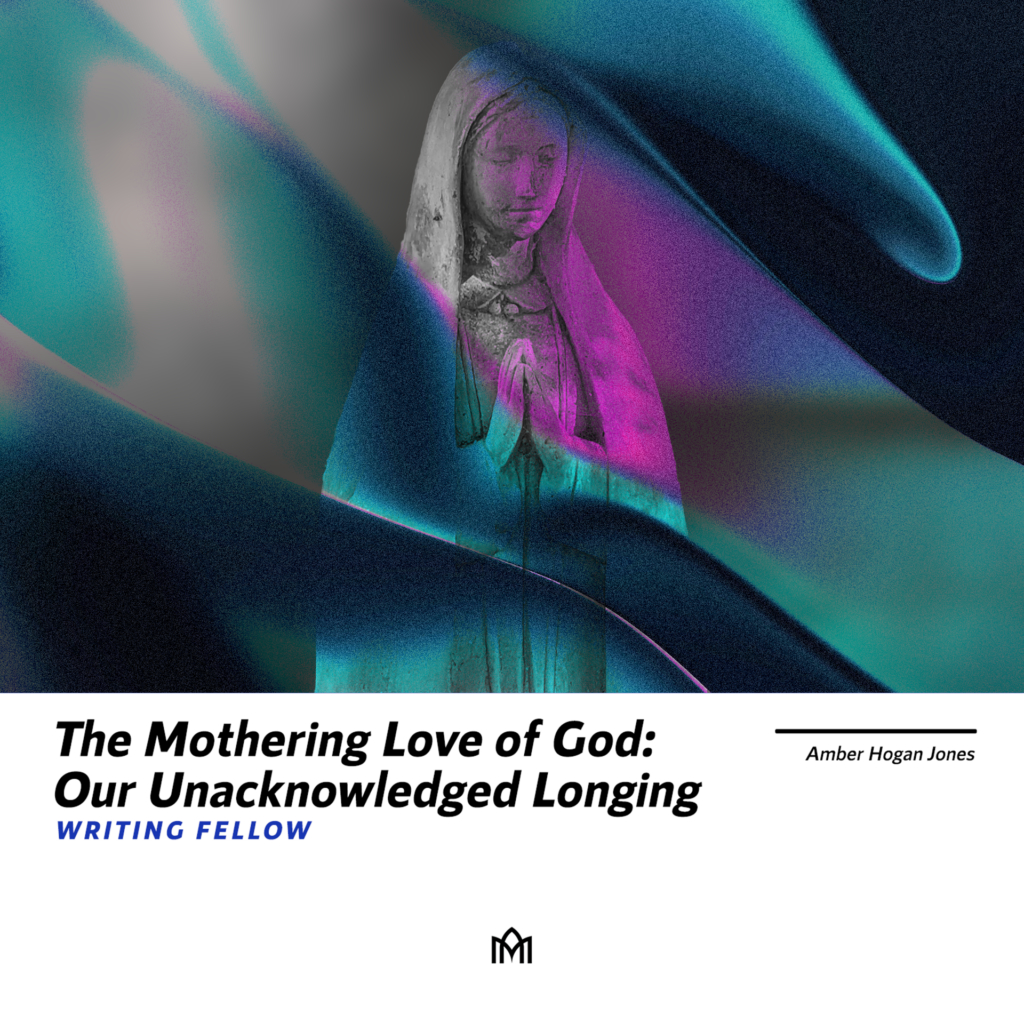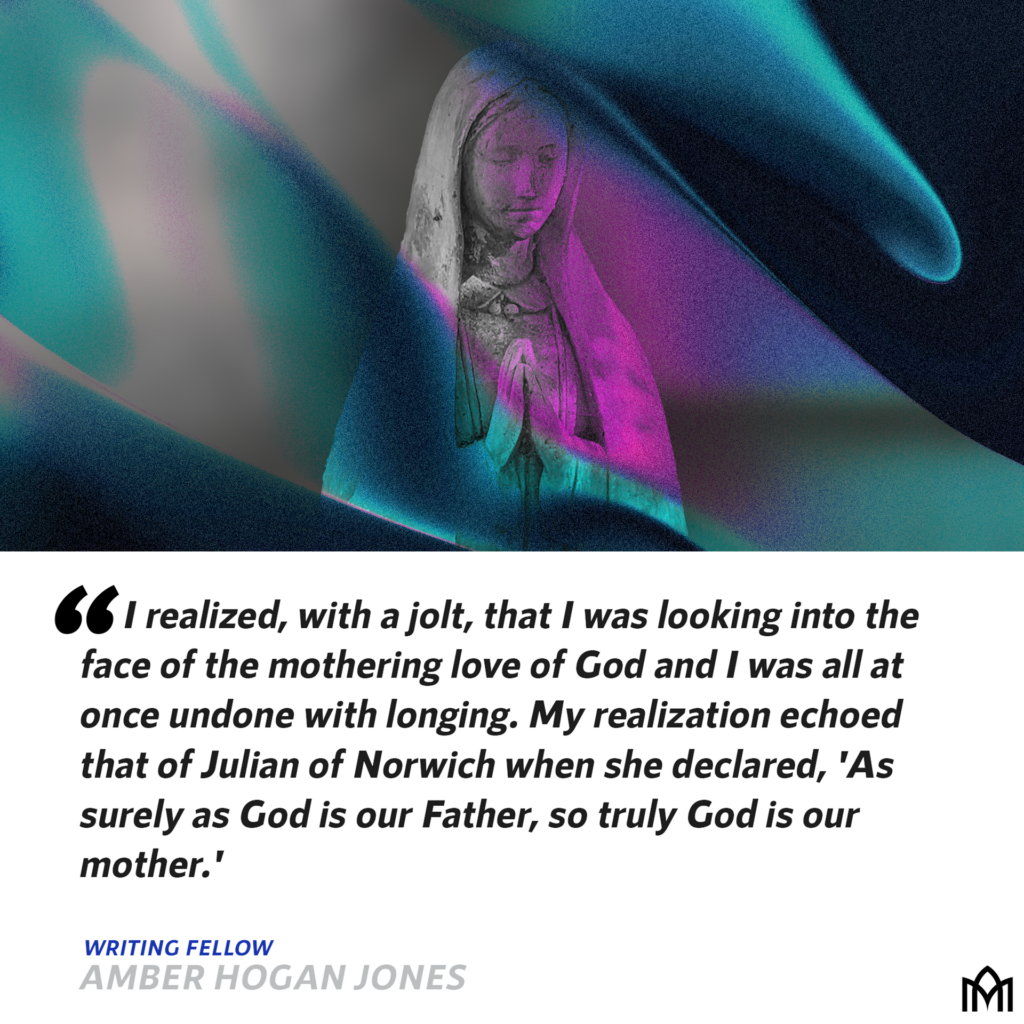The Mothering Love of God: Our Unacknowledged Longing

I was sitting by myself in the historic sanctuary of my church a few Sundays ago when I received an inner healing I didn’t realize I needed. Sunshine poured from the high windows and flooded the room with light as the celebrants blessed the elements before handing them to the deacons serving the congregation. Perhaps it was the exquisite music accompanying the communion service, or the powerful liturgy in the call-and-response that expanded my heart enough for God to attend to an unknown wound. I may never fully understand why, but when I looked up into the face of the mature woman serving me that day, I began to weep.
Something about her soulful, wise eyes moved me. The sight of her hands, soft and aged by years of serving others, soothed me. Kindness and welcome beamed from her face as she bent toward me and blessed me. I realized, with a jolt, that I was looking into the face of the mothering love of God and I was all at once undone with longing. My realization echoed that of Julian of Norwich when she declared, “As surely as God is our Father, so truly God is our mother.”1Julian of Norwich (1342-1416), Revelations of Divine Love, (LIX, LXXXVI).
This isn’t a new thought, by any means. Feminist and womanist scholars have questioned for decades what it does to us as a collective humanity when we only have male representations of God upon which to ponder and gaze. And I wasn’t alone in my epiphany during communion, as Sue Monk Kidd shared her own realization in her groundbreaking book The Dance of the Dissident Daughter:
“It never occurred to me how odd it was that women, who have presided over the domain of food and feeding for thousands of years, were historically and routinely barred from presiding over it in a spiritual context. And when the priest held out the host and said, ‘This is my body, given for you,’ not once did I recognize that it is women in the act of breastfeeding who most truly embody those words and who are also most excluded from ritually saying them.”2Sue Monk Kidd, The Dance of the Dissident Daughter: A Woman’s Journey from Christian Tradition to the Sacred Feminine, .
That I should crave a feminine image of God by which I can see myself more clearly isn’t surprising. As an adoptive parent, I’ve felt the anguish of watching my children long for a family member who mirrors not just their humanity back to them, but something specific about their identities and their very beings that only shared DNA can supply. Yet, the longing went deeper.
I was looking into the face of the mothering love of God and I was all at once undone with longing. My realization echoed that of Julian of Norwich when she declared, 'As surely as God is our Father, so truly God is our mother.' Share on X
Beyond seeing my being as a woman mirrored somehow by God, I recognized that there’s more at stake as well. Biblical scholar Rev. Dr. Wilda Gaffney explains it powerfully when she says,
“As long as a masculine God remains at the top of the pyramid, nothing else we do matters. We construct a theological framework in which we talk about gender equality…then we say that which is most holy in the universe is only and exclusively male. That just undoes some of the key theology that says we are equal in God’s sight, we are fully created in God’s image.”3“Is God male? The Episcopal Church debates whether to change its Book of Common Prayer,” Washington Post interview with Wilda Gaffney, July 8, 2018.
When it comes to believing women are equal to men in the sight of God, mere lip service will not suffice. We need to see it in our sacred Scriptures, hear it proclaimed from our pulpits, and experience it in our creative acts of devotion if we are to integrate this truth fully into ourselves. For women to fully participate in the life of the Incarnated Divinity, our houses of worship and faith communities must make space for the mothering love of God to be displayed and manifested.
Of course, what moved me that Sunday morning was more than feminine representation and participation. It wasn’t exactly a staggering revelation to understand that the longing I was feeling was for a Divine mothering love to supply a healing balm for the maternal wound within me. This is a longing I share with most of humanity, and perhaps that’s revealing enough in itself. Countless therapists and pastors have held the hands of wounded folks grieving the lack of maternal love they either have never experienced or have lost to estrangement or death. Many of the men and women I see in my spiritual direction practice are seeking closure or healing for the gnawing absence of maternal love in their own lives.
Deeply desiring to see women as they are (and not merely as extensions of men) reflected in the Imago Dei isn’t surprising, nor is longing for the mothering love of God to heal the maternal wound within us. But what did surprise me that day, and continues to echo in my soul, is the revelation that God deeply desires to provide both of those things for us, even though we are often too frightened and blind to receive these gifts. From the earliest days of the Church, we’ve not quite known what to do with parts of our Holy Scriptures that reveal the mothering or feminine love of God. Far from a post-modern, feminist perspective, the mothering love of God has been talked about since the inception of our faith. The understanding of God’s love in this light has been expounded upon by some of our greatest theologians and philosophers as they’ve worked to integrate this truth into our faith traditions.
Feminist and womanist scholars have questioned for decades what it does to us as a collective humanity when we only have male representations of God upon which to ponder and gaze. (1/3) Share on X
To believe women are equal to men in the sight of God, mere lip service will not suffice. We need to see it in our sacred Scriptures, hear it proclaimed from our pulpits, and experience it in our creative acts of devotion. (2/3) Share on X
For women to fully participate in the life of the Incarnated Divinity, our houses of worship and faith communities must make space for the mothering love of God to be displayed and manifested. (3/3) Share on X
Clement of Alexandria said this of God’s love for humankind:
“For what further need has God of the mysteries of love? And then you shall look into the bosom of the Father, whom God the only-begotten Son alone has declared. And God Himself is love; and out of love to us became feminine. In His ineffable essence He is Father; in His compassion to us He became Mother. The Father by loving became feminine: and the great proof of this is He whom He begot of Himself; and the fruit brought forth by love is love.”4Clement of Alexandria, “Who is the Rich Man that Shall Be Saved?,” section 37)
And John Chrysostom, centuries later, one of the greatest preachers of his time, penned this benediction:
“Thou art my Father, thou art my Mother, thou my Brother, thou art Friend, thou art Servant, thou art House-keeper; thou art the All, and the All is in thee; thou art Being, and there is nothing that is, except thou.”5John Chrysostom, Homilies on the Gospel of Saint Matthew.
The examples of this sentiment echo throughout church history, from Origen and Jerome, to John Calvin and Hildegard of Bingen, and through so many others. Some of the greatest Christian theologians and church leaders haven’t found God’s mothering love and fathering love to be in any way opposed or in competition. Rather, they’ve recognized both the human need for the experience of both aspects of God’s image and relationship, as well as God’s deep longing to offer this complete gift to us.
Yet, it’s Jesus’ own words that underscore this truth most vividly, as found in the Gospel of Matthew, chapter 23, when he refers to God as Father (vs. 9) and then depicts the love of God using mother imagery in the same chapter,
“Jerusalem, Jerusalem!..How many times I wanted to put my arms around all your people, just as a hen gathers her chicks under her wings, but you would not let me! And so your Temple will be abandoned and empty” (Matthew 23:37-38).6Matthew 23:37-38; see also Psalm 57:1, Deuteronomy 32:11-12.
Perhaps within these words of Christ we find the challenge and the invitation to experience God in a way that can bring the collective healing we so desperately need in this age of loneliness, disconnection, and emptiness. Men and women alike are hungry for a real antidote to both oppression and cancel culture, as well as a safe and welcoming place to heal from the duality of victim and perpetrator that lives within us all. If we can only look up into the face of a God who longs to father and mother us, who extends a complete love found in open arms of protection and nurturance, perhaps we can finally drop the defenses we’ve erected to guard ourselves from one another and, instead, ease into the comforting waters of new birth in which we protect and nurture one another in freedom.
I was recently speaking with a new cadre of college students who have joined our church, and I mentioned that one unique feature they’d find among our congregation is “mother and father energy” in abundance. As the parent of several adult children myself, I had a hunch this might appeal to them as students being far from home. Yet, I wasn’t only referring to the older men and women who would happily take these young people under their wings, but also to the God worshipped within our sanctuary who is both our father and our mother who longs to take us under Divine wings of provision and love.
My instincts proved correct as they replied enthusiastically–with longing in their voices–that this was precisely what they needed in their lives. With a smile and a nod, remembering the mothering love of God entering my life unexpectedly during a communion service in the same sanctuary in which these young people now stood, I responded with emotion in every syllable, “Yeah, me too.”
///
Deeply desiring to see women as they are (and not merely as extensions of men) reflected in the Imago Dei isn’t surprising, nor is longing for the mothering love of God to heal the maternal wound within us. (1/2) Share on X
But what did surprise me that day, and continues to echo in my soul, is the revelation that God deeply desires to provide both of those things for us, even though we are often too frightened and blind to receive these gifts. (2/2) Share on X
*Editorial Note: Amber’s first piece for Missio Alliance as a 2024 Writing Fellow was a nuanced and profound piece on the nature of freedom, and our collective need for freedom to mature and grow, entitled The Common Good: What Is Freedom For? Stay tuned for more from her later this year! ~CK




